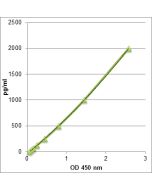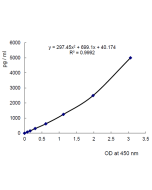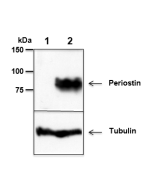Cookie Policy: This site uses cookies to improve your experience. You can find out more about our use of cookies in our Privacy Policy. By continuing to browse this site you agree to our use of cookies.
AdipoGen Life Sciences
Periostin (human) Matched Pair Detection Set

| Product Details | |
|---|---|
| Synonyms | Osteoblast-specific Factor 2; OSF-2; Postn |
| Product Type | Set |
| Properties | |
| Application Set | Quantitative ELISA |
| Specificity | Detects human periostin. |
| Crossreactivity | Human |
| Quantity | Contains sufficient materials to run ELISAs on 5 x 96-well plates. |
| Sensitivity | 30pg/ml |
| Range | 80 to 5000pg/ml |
| Sample Type |
Cell Culture Supernatant Plasma Serum |
| Assay Type | Sandwich |
| Detection Type | Colorimetric |
| Kit Contains |
1 vial standard protein (0.1μg) (lyophilized) [STD] 1 vial coating antibody (120μl) [COAT] 1 vial detection antibody (60μl) [DET] 1 vial streptavidin-HRP (10μg) (lyophilized) [STREP] |
| Shipping and Handling | |
| Shipping | BLUE ICE |
| Short Term Storage | -20°C |
| Long Term Storage | -20°C |
| Handling Advice | Avoid freeze/thaw cycles. |
| Use/Stability | Stable for at least 1 year after receipt when stored at -20°C. |
| Documents | |
| Manual |
 Download PDF Download PDF |
| MSDS |
 Download PDF Download PDF |
| Product Specification Sheet | |
| Datasheet |
 Download PDF Download PDF |
Periostin is a 90-kDa matricellular protein that consists of a typical signal sequence, followed by a cysteine-rich region, an EMI domain (protein-protein interactions), four tandem fasciclin-like domains that are responsible for integrin binding, and a C-terminal region. Periostin was originally isolated as an osteoblast-specific factor that functions as a cell adhesion molecule for pre-osteoblasts and in osteoblast recruitment, attachment and spreading. Periostin is also involved in many fundamental biological processes such as cell proliferation, cell invasion and angiogenesis. Periostin expression is increased by both transforming growth factor β1 (TGF-β1) and bone morphogenetic protein 2 (BMP-2). Changes in periostin expression are commonly detected in various cancers and pre-cancerous conditions, and periostin may be involved in regulating cancer cell activities that contribute to tumorigenesis, cancer progression and metastasis. Periostin up-regulation in cancers usually correlates with aggressiveness and/or poor survival. Periostin has shown to be involved in many aspects of allergic inflammation, such as eosinophil recruitment, airway remodeling, development of a Th2 phenotype and increased expression of inflammatory mediators. It is evaluated as a biomarker for bronchial asthma and airway inflammation.
- Prognostic Value of Preoperative Serum Levels of Periostin (PN) in Early Breast Cancer (BCa): P.V. Nuzzo, et al.; Int. J. Mol. Sci. 16, 17181 (2015)









